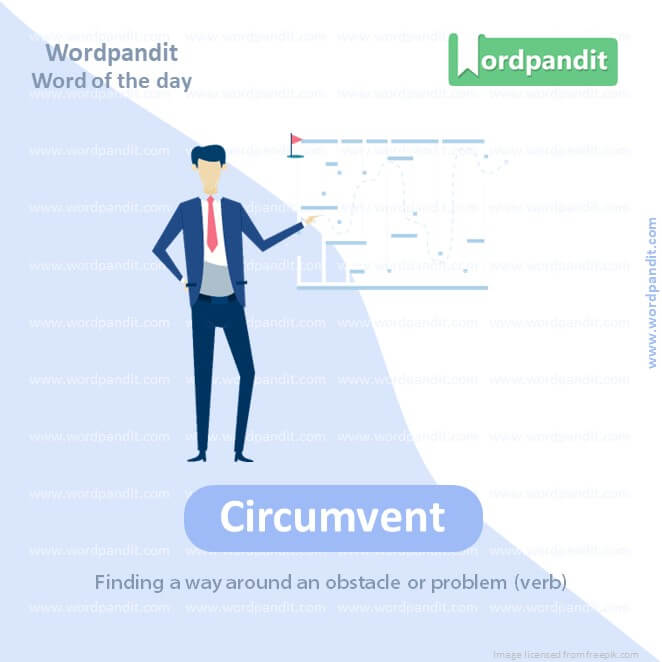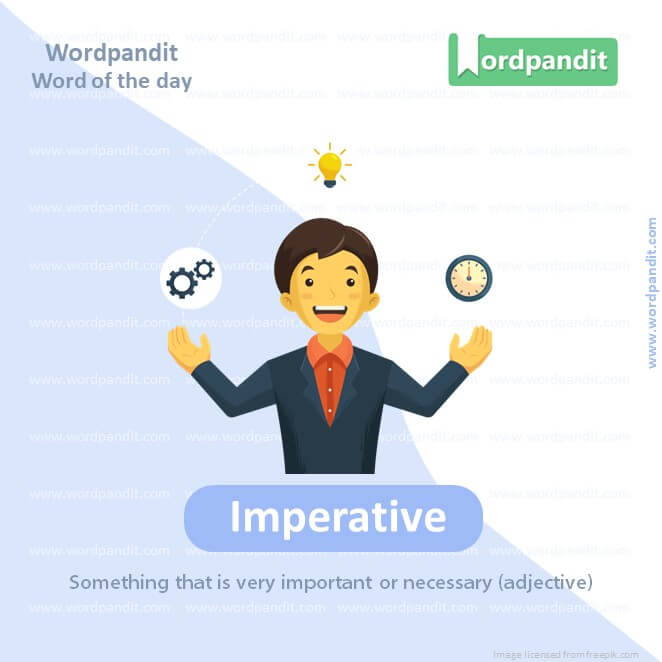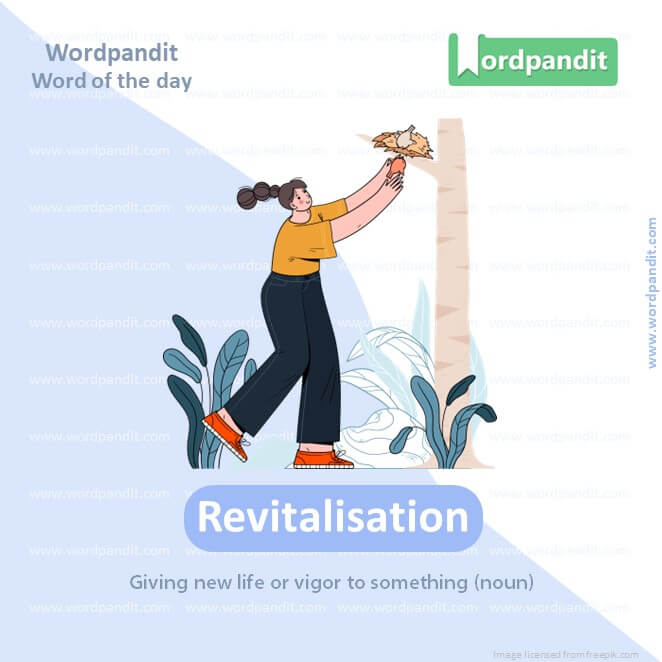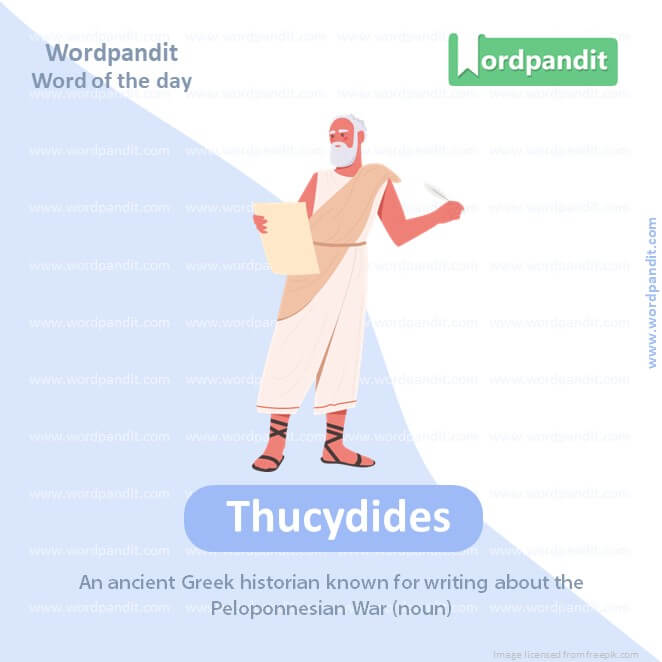Daily Vocabulary Words: List of Daily Used Words
Hi there. Welcome to this special section @ Wordpandit.
Our endeavour here is straightforward: highlighting important daily vocabulary words, you would encounter in The Hindu. This is your repository of commonly used words; essentially, we are posting a list of daily used words. Hence, this has significant practical application as it teaches you words that are commonly used in a leading publication such as The Hindu.
Visit the website daily to learn words from The Hindu.

WORD-1: Circumvent
CONTEXT: where our elected representatives find ingenious methods to circumvent the anti-defection law.
SOURCE: The Hindu
EXPLANATORY PARAGRAPH: Imagine you want to reach your favorite toy on the other side of the room, but there’s a big obstacle in the way. Instead of going through it, you walk around it. That’s what “circumvent” means to find a way around something.
MEANING: Finding a way around an obstacle or problem (verb).
PRONUNCIATION: Sir-cum-vent
SYNONYMS: Bypass, avoid, dodge, sidestep, skirt, evade, elude.
USAGE EXAMPLES:
1. She tried to circumvent the rules by doing things her own way.
2. To avoid the traffic, he decided to circumvent the city.
3. They found a loophole to circumvent the law.
4. You can’t always circumvent your problems; sometimes you have to face them.

WORD-2: Imperative
CONTEXT: It is imperative that Speakers eschew the ‘impropriety’ in their functioning and demonstrate impartiality
SOURCE: The Hindu
EXPLANATORY PARAGRAPH: “Imperative” is like when your mom says you must brush your teeth before bed. It’s something very important or necessary to do.
MEANING: Something that is very important or necessary (adjective).
PRONUNCIATION: Im-peer-a-tiv
SYNONYMS: Crucial, vital, essential, necessary, urgent, paramount.
USAGE EXAMPLES:
1. It’s imperative to wear a seatbelt while driving.
2. Drinking water is imperative for health.
3. It’s imperative that we finish this project on time.
4. Learning to read is imperative for students.

WORD-3: Revitalisation
CONTEXT: with a population of over one billion, China and India are both at a crucial stage of development and revitalisation.
SOURCE: The Hindu
EXPLANATORY PARAGRAPH: Imagine if your toy’s battery ran out, and you replaced them, making the toy work and play again. “Revitalisation” is like giving new energy or life to something.
MEANING: Giving new life or vigor to something (noun).
PRONUNCIATION: Re-vi-ta-li-za-tion
SYNONYMS: Renewal, rejuvenation, resurgence, restoration, regeneration.
USAGE EXAMPLES:
1. The park underwent a revitalisation with new playground equipment.
2. The town’s revitalisation attracted many new businesses.
3. Her vacation led to the revitalisation of her spirit and energy.
4. The project aims at the revitalisation of the old city center.

WORD-4: Decoupling
CONTEXT: Unilateralism, protectionism, decoupling, and the zero-sum game of the “winner-takes-all” should be rejected.
SOURCE: The Hindu
EXPLANATORY PARAGRAPH: Imagine you have a train made of toy blocks. If you take two blocks apart, you’re separating or “decoupling” them. “Decoupling” means to take things apart or separate them.
MEANING: The act of separating or removing the connection between two things (noun).
PRONUNCIATION: Dee-kup-ling
SYNONYMS: Disconnecting, detaching, disjoining, severing, uncoupling.
USAGE EXAMPLES:
1. Decoupling the devices made them work independently.
2. There was a decoupling of the trailer from the truck.
3. Economists discussed the decoupling of economic growth from environmental degradation.
4. The company is considering the decoupling of its two main business units.

WORD-5: Thucydides
CONTEXT: emerging countries and established powers can avoid falling into the Thucydides trap and build common ground and achieve common development for different civilisations and countries with different social systems.
SOURCE: The Hindu
EXPLANATORY PARAGRAPH: Thucydides was a man from a long time ago who wrote about wars and events of his time. He’s like a storyteller of the past.
MEANING: An ancient Greek historian known for writing about the Peloponnesian War (noun).
PRONUNCIATION: Thu-sid-id-ees
SYNONYMS: Historian, chronicler, annalist, scribe, recorder.
USAGE EXAMPLES:
1. Thucydides wrote about the conflict between Athens and Sparta.
2. Students study Thucydides to understand ancient Greek history.
3. His writings are considered a primary source by historians.
4. The account by Thucydides provides a detailed chronicle of the war.
WORD-6: Cohesion
CONTEXT: Hosting the Games involves different cogs in the wheel — culture, heritage, hospitality, infrastructure, finance, government, and sports bodies — which have to work in cohesion.
SOURCE: The Hindu
EXPLANATORY PARAGRAPH: “Cohesion” is like when you and your friends hold hands and stick together. It’s about things being close and united.
MEANING: The action of staying united or sticking together (noun).
PRONUNCIATION: Co-hee-zhun
SYNONYMS: Unity, bond, togetherness, solidarity, attachment.
USAGE EXAMPLES:
1. The team showed great cohesion during the match.
2. Water droplets on a leaf demonstrate cohesion.
3. Their cohesion was the key to their success.
4. The group lacked cohesion, leading to its downfall.
WORD-7: Galvanise
CONTEXT: I am not sure if we will be able to galvanise everyone for an event like this.
SOURCE: The Hindu
EXPLANATORY PARAGRAPH: “Galvanise” is like when you see your favorite dessert and suddenly feel excited and want to eat it right away. It’s about being stirred up to take action quickly.
MEANING: To excite or inspire someone to take action (verb).
PRONUNCIATION: Gal-va-nize
SYNONYMS: Motivate, inspire, stimulate, energize, rouse.
USAGE EXAMPLES:
1. The coach’s speech galvanised the team to play their best.
2. The news galvanised the community into action.
3. She galvanised her classmates to raise funds for the cause.
4. The event galvanised him to start a new project.
WORD-8: Feasibility
CONTEXT: We need to shortlist cities and hire feasibility consultants who can give unbiased and unpolitical reports about which city could host the Games best.
SOURCE: The Hindu
EXPLANATORY PARAGRAPH: “Feasibility” is like checking if your toy can float in water. It’s about seeing if something is possible or can work.
MEANING: The possibility or likelihood that something can be achieved (noun).
PRONUNCIATION: Fee-za-bi-li-ty
SYNONYMS: Practicality, viability, possibility, doability, achievability.
USAGE EXAMPLES:
1. We are checking the feasibility of the new project.
2. The feasibility study showed positive results.
3. The team doubted the feasibility of the plan.
4. Before investing, they wanted to ensure its feasibility.
WORD-9: Merchandise
CONTEXT: Exclusive merchandise and press junket invites are mostly extended to those who have played ball with the studio or streamer’s earlier offerings.
SOURCE: The Hindu
EXPLANATORY PARAGRAPH: “Merchandise” is like the toys in a toy store. They are things that are made and sold in shops.
MEANING: Goods that are produced to be sold (noun).
PRONUNCIATION: Mur-chun-dize
SYNONYMS: Products, goods, commodities, items, wares.
USAGE EXAMPLES:
1. The store offers a wide range of merchandise.
2. The band sold their merchandise during the concert.
3. The merchandise was displayed attractively to attract customers.
4. She was in charge of ordering new merchandise for the shop.
WORD-10: Critique
CONTEXT: the marketing team doesn’t like your critique, you are in danger of being frozen out of mailing lists.
SOURCE: The Hindu
EXPLANATORY PARAGRAPH: “Critique” is when someone looks at your drawing and tells you what they like about it and what you can make better. It’s like giving helpful feedback.
MEANING: A detailed analysis and assessment of something (noun).
PRONUNCIATION: Kri-teek
SYNONYMS: Review, analysis, evaluation, assessment, appraisal.
USAGE EXAMPLES:
1. The teacher gave a detailed critique of his essay.
2. The film received mixed critiques from critics.
3. She appreciated the honest critique from her friend.
4. The art gallery hosted a session for critique and discussion.
Vocabulary Synonyms
In the intricate weave of language learning, ‘vocabulary synonyms’ emerge as a key element that adds depth and variety to expression. These different words with similar meanings enrich our vocabulary, enabling us to communicate with precision and clarity. However, grasping ‘vocabulary synonyms’ successfully warrants a systematic approach.
When approaching ‘vocabulary synonyms’, context is your compass. Engage with various reading materials like novels, newspapers, and digital content to explore and understand how these synonyms are used in different situations. This exposure will fortify your comprehension of ‘vocabulary synonyms’ and their usage nuances.
Employing memory-enhancing techniques can cement your grasp on ‘vocabulary synonyms’. Employing flashcards is an effective method where one side contains the word you know, and the other side has its synonyms. Also, creating mind maps, linking the known word to its various synonyms, can be an engaging way to learn ‘vocabulary synonyms’.
To master ‘vocabulary synonyms’, take an active role in application. Regular conversations, written communications, digital interactions – all of these offer ample opportunities to utilize learnt synonyms. This practice refines your application and accelerates internalization of ‘vocabulary synonyms’.
Embracing language exchange platforms or engaging with native speakers can provide invaluable feedback on the usage of ‘vocabulary synonyms’. This interaction can further enhance your understanding of the cultural idiosyncrasies of word usage.
In conclusion, learning ‘vocabulary synonyms’ is a rewarding pursuit that adds layers of complexity to your language skills. A thoughtful blend of diversified resources, memory tools, practice, and interactive learning can make the task of mastering ‘vocabulary synonyms’ an enjoyable and fruitful journey. Every synonym learnt paints your vocabulary with different shades of understanding, making your language canvas all the more vivid and spectacular!













